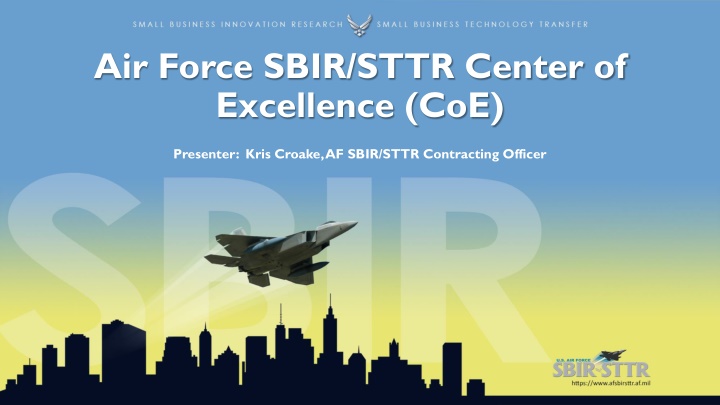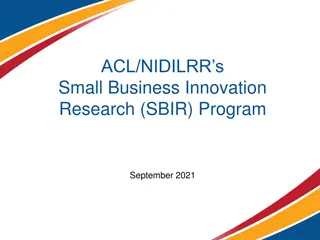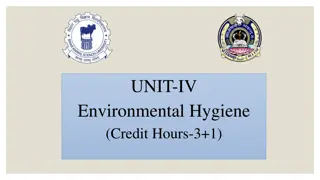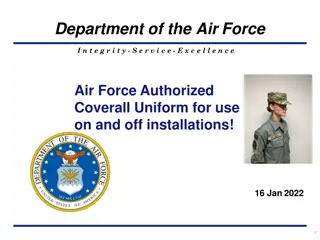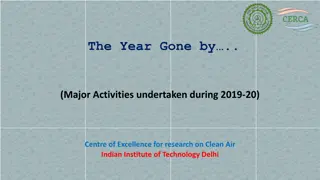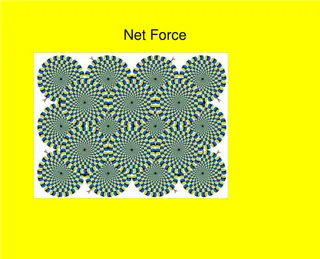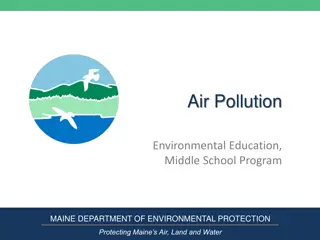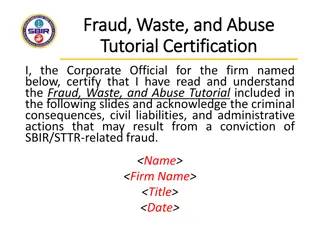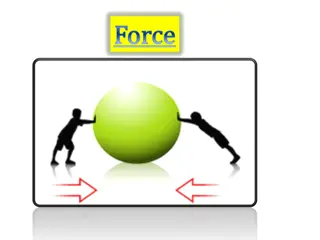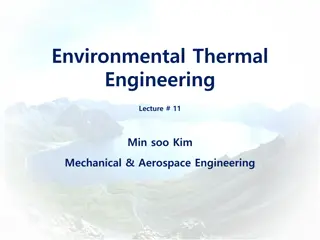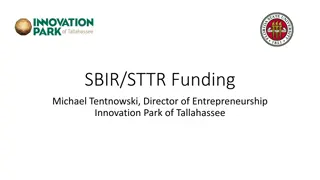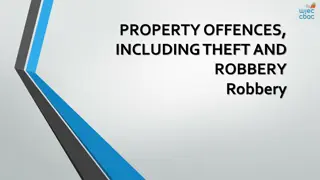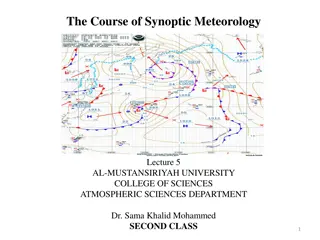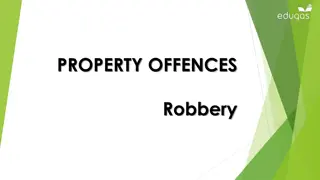Air Force SBIR/STTR Center of Excellence
The Air Force SBIR/STTR Center of Excellence, led by Kris Croake, focuses on streamlining business initiatives, enhancing learning experiences, and exploring innovative funding methods to support small businesses. The center prioritizes SBIR/STTR awards, provides advisory support, and emphasizes post-award administration challenges to improve efficiency and effectiveness.
Download Presentation

Please find below an Image/Link to download the presentation.
The content on the website is provided AS IS for your information and personal use only. It may not be sold, licensed, or shared on other websites without obtaining consent from the author.If you encounter any issues during the download, it is possible that the publisher has removed the file from their server.
You are allowed to download the files provided on this website for personal or commercial use, subject to the condition that they are used lawfully. All files are the property of their respective owners.
The content on the website is provided AS IS for your information and personal use only. It may not be sold, licensed, or shared on other websites without obtaining consent from the author.
E N D
Presentation Transcript
Air Force SBIR/STTR Center of Excellence (CoE) Presenter: Kris Croake, AF SBIR/STTR Contracting Officer
AF SBIR/STTR Contracting SBIR/STTR Contracting centralized within AF SBIR/STTR CoE IOC: June 2019 FOC: December 2019 Prioritizes SBIR/STTR awards Business Accelerator piloting streamlined business initiatives Augment sprints with non-SBRK AF PK assets, providing experiential learning Provide advisory support for pitch events Explore streamlined payment methods Leverage other funding to complement SBIR, e.g., non-SBIR Governmental, private capital Use of specific authorities (OTP, CSO, etc.) Explore other potential streamlining authorities Use FFP purchase orders/contracts/OTs for all Phase I/II awards 2
SBRK Roles and Responsibilities Execute AF SBIR/STTR Phase I, II, and STRATFi Phase IIB awards Create/coordinate AF SBIR/STTR instructions to DoD BAAs Execute AF SBIR/STTR CSOs for open topics Primary AF SBIR/STTR Business Advisor to SAF/MAJCOMS/ Centers Provide advice/policy/tools/templates to other AF/DoD organizations for Pitch Events and Phase III SBIR/STTR awards Provide information/guidance to myriad small businesses, academia, and AF/DoD orgs/individuals through Help Desk and direct contact 3
Challenges SBIR/STTR Contract Administration Initial CoE manpower study didn t consider post-award administration DCMA no longer accepts most R&D contracts 100% of CoE workload SBRK accomplishes all invoice approval, novations, etc. Documentation and Processes Do not yet have access to electronic file capability in CON-IT Files on SharePoint not extremely user friend and not official Struggle finding time to ensure consistency in contents and flow Insufficient time to document processes, capturing lessons learned and refinements made over time Personnel: Number/Experience Level - 22 1102s, one attorney, one mgmt analyst Did not consider post-award in initial manpower study (see above) Participate in all six solicitation cycles, issue out-of-cycles, plus Phase II instructions PK organizations wouldn t accept vacant positions in exchange for experienced 1102s; currently have 10 interns on staff 4
Contracting Wins Effectively leverage matching funds for Phase IIs Use of both Government and third-party investment Facilitates transition to dual-use/commercialization First time CON-IT use for R&D awards Allows seamless flow of PRs to system and Hill SMXG to pre-populate contracts based on CO/buyer input Identify functional improvements for continued CON-IT fielding AF CoE-funded CON-IT developers/Hill SMXG project benefits AF contracting community First time OTA use to award Phase IIs Provides more flexibility; reduces bureaucratic/complex acquisition processes Attracts increased non-traditional contractors Use of Commercial Solutions Opening (CSO) (AF SBIR/STTR Program Pilot) Facilitates use of matching non-SBIR funding on SBIR Phase IIs Workforce Development Sprints provide experiential learning to AF CO/Specialists All benefit from diverse contracting skills and experience 5
Tools/Templates/Processes - Highlights Tools Due diligence pre-sprint tool; uses yes/no answers to std questions, auto-generates/sends fact-finding emails to offerors, if needed Hill SMXG developed spreadsheet for CO/Specialist input; upload pre-populates majority of contract document, greatly reducing manual input Electronic contract files Templates Notification/distribution letters, streamlined PNM/ANM, blanket waivers to standard forms, FPDS step-by-step guide, Processes Patent process whereby Government PMs provide information in bulk Streamlined invoicing process using AFWERX as conduit between TPOCs and SBRK Class legal reviews by solicitation, phase, and award type 6
